LATEST NEWS

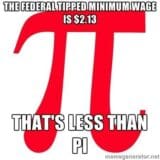
Are zero-dollar pay stubs and sub-minimum wages really what keep the restaurant industry afloat? That’s what one powerful lobbying group would have us believe.
Taylor Lee can tell you the real impact of minimum wages for tipped workers. Taylor is a 23-year-old restaurant server working in Berkeley, California. Like two-thirds of tipped workers, she is a woman. In California, the minimum wage is currently $8 per hour, whether you get tips or not. This is the amount that Taylor’s employer pays her, “but with tips, if it’s really slow, I make $12 per hour,” she says. “My average wage is about $18-20 per hour.”
From 2006 to 2013, Taylor worked as a server at restaurants in Florida. The minimum wage in Florida is $7.93, but the minimum wage for tipped workers is $4.91. She worked at a Japanese restaurant as a server. If she didn’t get enough tips to make it to $7.93 per hour,


The years-long fight of Los Angeles Port truck drivers to be recognized as company employees– instead of “independent contractors” who lack workplace rights and protections – burst into a 48-hour strike this morning. The work stoppage by drivers for four major trucking firms is organized by Justice for Port Drivers and is targeting the marine container terminals at the twin ports of Los Angeles and Long Beach.
Despite winning a string of labor court rulings in wage theft lawsuits, the drivers say they are still misclassified as independent contractors. That misclassification has meant that drivers are denied overtime wages, workers compensation, disability and a host of other benefits, and must pay for the fuel and maintenance of their vehicles. It has also guaranteed that after paycheck deductions, many drivers who work long hours during six-day weeks earn poverty wages.
This is the second strike in six months by drivers,
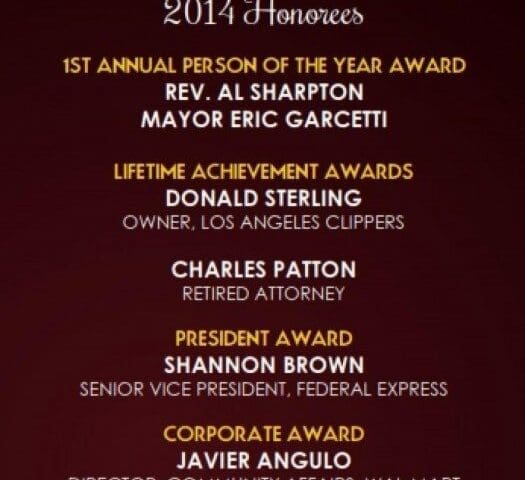
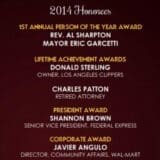
In an excruciating example of bad timing, the Los Angeles chapter of the NAACP was scheduled to bestow its Lifetime Achievement Award to Donald Sterling, owner of the Los Angeles Clippers basketball team, at its May 15 banquet. Sterling is now under fire for racist comments caught on a recording that surfaced on the TMZ website. Even President Barack Obama weighed in, condemning Sterling’s remarks as “incredibly offensive.” The NBA is now investigating Sterling’s remarks and could invoke sanctions, including removing him as Clippers’ owner.
Embarrassed by the controversy, the NAACP announced Sunday morning, via Twitter, that is was withdrawing the award, which was to be presented at the Millennium Biltmore Hotel in Los Angeles as part of the celebration of the chapter’s 100th anniversary. The NAACP also plans to honor Rev. Al Sharpton and Los Angeles Mayor Eric Garcetti — as well as Walmart’s local charity and political operative and a top Fed Ex executive —


It’s been a long, dark road for America’s port truck drivers, but finally there’s a light at the end of the tunnel. After nearly 30 years of ruthless exploitation by the trucking industry, the drivers who transport the goods that fuel our consumer economy may be poised to rejoin the country’s middle class, thanks to an important determination by a regional office of the National Labor Relations Board.
Last month, the NLRB’s Los Angeles office announced the settlement of a casebrought by truck drivers against Pacific 9 Transportation Inc. The drivers alleged that the company had illegally used threats and intimidation to prevent them from exercising their right to form a union, a practice that is rampant across the country thanks to our lax labor laws.
But here’s where it gets interesting. Pac 9’s drivers are considered independent contractors by the company and, according to labor law, independent contractors —
» Read more about: America’s Sweatshops on Wheels Find a Light at the End of the Tunnel »


After years of neglect, the minimum wage has suddenly become a major national issue. President Obama has proposed an increase in the federal minimum to $10.10 an hour, fast food workers are agitating for $15, and candidates who back a higher wage floor, including an avowed socialistin Seattle, are winning local elections. In February, the retailer Gap Inc. announced that it was implementing a nationwide minimum wage for 65,000 of its own 90,000 employees (although only $9 an hour).
The minimum wage is an important issue in other countries as well, although we rarely hear about these cases.
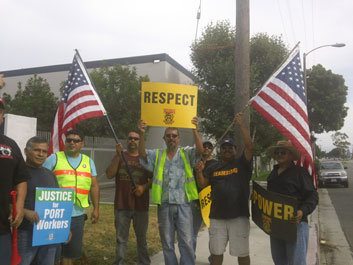
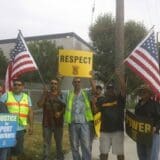
Almost 50 years ago, Bob Dylan recorded with an electric guitar and band for the first time and produced Subterranean Homesick Blues, a culture-altering event that claimed, among other things, that, “you don’t need a weatherman to know which way the wind blows.” That song signaled a cultural change that resonated with forward-looking people of the time, but the truth was ignored or dismissed by those who preferred to look back. Similarly, this is a moment when the wind is blowing strongly in the direction of justice, and those who ignore it risk being left behind.
In previous articles, we have highlighted the prevalent fiction of “independent contracting,” a deception that affects the 12,000 port truck drivers who dray goods out of the Ports of Los Angeles and Long Beach, among the 75,000 drivers nationwide. Drivers in the current system must pay a lease on a truck,
» Read more about: Port Drivers’ Misclassification Homesick Blues »


Energy efficiency is the Swiss Army Knife of public policy. It’s Veg-o-matic. It slices and dices. No matter the question, energy efficiency just might be the answer.
What technology saves you money on your utility bill? How can businesses become more competitive? What reduces greenhouse gas emissions at the lowest cost? Energy efficiency is the correct answer to all-of-the-above.
Now add another benefit: energy efficiency can help prepare us for climate change.
Think about the hot summer days when electricity use skyrockets. On L.A.’s hottest day on record – 113° Fahrenheit on September 27, 2010 – LADWP delivered a whopping 6,177 megawatts. It was the all-time high in power demand, mainly to power air-conditioners and refrigerators.
But, when the grid is overtaxed, there’s also a high likelihood of power outages. More than an inconvenience, blackouts are a public health problem. During the Chicago heat wave of 1995,
» Read more about: It Slices, It Dices – the Magic of Energy Efficiency »


There has been no shortage of ink spilled on the so-called “sharing economy”. To cut through the rhetoric, LAANE’s Jon Zerolnick spoke with Tom Slee, an Ontario-based writer whose work on the intersection of technology, politics, and economics has appeared in The Literary Review of Canada, The New Inquiry, The Guardian, and Jacobin.
 Let’s start with some definitions. What is the sharing economy?
Let’s start with some definitions. What is the sharing economy?
The sharing economy is internet platforms, and more-or-less independent people exchanging real-world goods and services through those platforms. This doesn’t necessarily have anything to do with sharing, but that is the name now.
Some of these platforms started off non-commercial. I’m thinking of things like Couch Surfing, where individuals host each other in their own homes, with no money exchanged; it was a non-profit and provided a coordination service.
» Read more about: Couch Surfers and Billionaires: On the Sharing Economy »
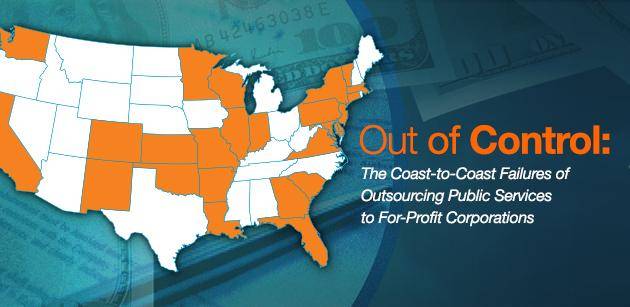
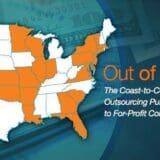
What if we had no government services and everything we used to get from government was run by private corporations? McDonald’s could be running the welfare system, Target the public schools and Walmart our mass transportation networks. What would be wrong with that?
According to Donald Cohen, director of the nonprofit research and action group In the Public Interest, there’s a long list of problems we face when private companies take over government services. For one, it’s hard to find out how much money is being paid to the company’s employees and corporate heads. And, once a formerly public system is taken over by a private company, there’s often no way that voters can set standards for those salaries, the quality of the work done or the cost of services to the public. Right now if you don’t like McDonald’s corporate policies, you can pick another restaurant. But when private companies take over government services,
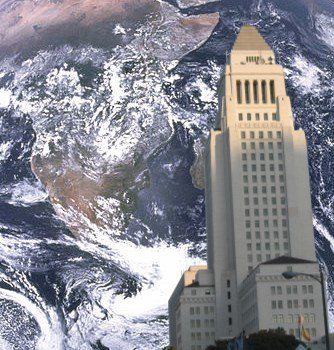

Earth Day is the birthday of the modern environmental movement in the U.S. and across the globe. Today, on this 44th Earth Day, the City of Los Angeles – the second largest in the nation and a mighty economic engine on the West Coast—celebrates its commitment to environmental protections and sustainability with a model Zero Waste ordinance just signed into law by Mayor Eric Garcetti. The days when the city sent three to four million tons of trash to landfills every year from apartment and commercial buildings are ending. Now, Los Angeles is set to achieve the highest recycling rates and best standards of environmental protection from the greenhouse gas emissions, air and groundwater pollution, and loss of recyclable material resources associated with our waste management.
Landfilling or burning millions of tons of trash subjects our residents and our environment to a distressing assault. Landfills and poorly regulated facilities disproportionately impact low income communities of color—as these communities are either employed or housed in close proximity,
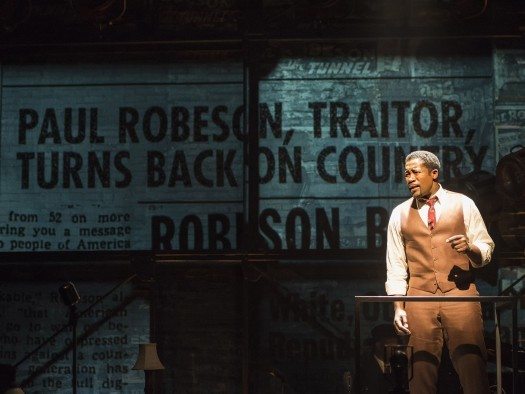
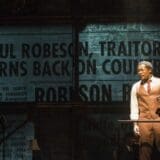
You’ve heard him sing Ol’ Man River, but you may not know his name or that he was a left-wing activist. As mentioned in the program notes for the one-man show The Tallest Tree in the Forest, now playing at the Mark Taper Theater, “the most extraordinary thing about Paul Robeson’s life is that more people don’t know about it.”
For that we can thank the House Un-American Activities Committee that questioned Robeson’s loyalty and effectively destroyed his career, along with the careers of hundreds of other American radicals of the 1940s and 50s. And what a career it was. The son of a father born into slavery, Robeson excelled in collegiate sports and academics and, after earning a law degree from Columbia University, joined the Harlem Renaissance and became a brilliant stage and music performer. Robeson developed a worldwide following with his powerful renditions of Negro spirituals and later with his performance of Othello in New York,
» Read more about: The Tallest Tree in the Forest: Appreciating Paul Robeson »
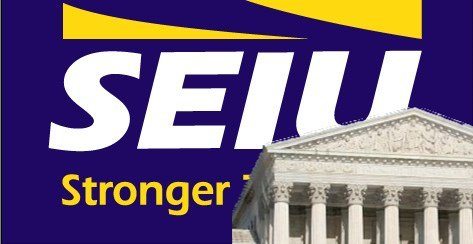
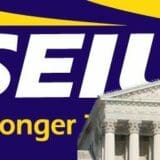
Springtime is typically emblematic of the birth and growth of new life forms. However, in 2014 this time of year could become a moment of death for the labor movement as we have come to know it. In the coming weeks the United States Supreme Court will render a decision in the case of Harris v. Quinn that could paralyze labor’s ability to organize workers throughout the country. Despite its major implications, the case remains largely absent from our mainstream discourse or even within discussions among progressive allies.
Harris v. Quinn comes out of years of successful organizing by the Service Employees International Union to win collective bargaining rights for thousands of home health and child care workers in Illinois. In 2009, Democratic Governor Pat Quinn signed an executive order to grant home care workers the right to unionize.
The main plaintiff in the case,


A quarter of all working Americans have no savings, and half die with less than $10,000 in financial assets. Nevertheless, some of us will have a small nest egg, and where to put that bit of money can be a challenge. Even for many socially minded people what we know we’ve learned from “talking to Chuck.” But there are alternatives and they matter.
I first became aware of other ways to think about investments when I realized my denomination’s retirement fund screens its portfolio for tobacco, alcohol, gambling and guns. Many other faith communities with substantial funds do also. There are also a number of public mutual funds that have significant track records in screening for social responsibility issues. Some invest in alternative energy. Some avoid military contractors. Some look for environmentally enhancing product lines. Others invest in locally owned small businesses or in organic food sources. And some do a combination of all those.
» Read more about: Finance the Future By Investing in Change »


Nina Revoyr is the author of four acclaimed novels, including Southland, The Age of Dreaming and Wingshooters. She is also executive vice president of Children’s Institute in Los Angeles and has taught at Pitzer and Occidental colleges, and at Antioch and Cornell universities. Revoyr will be this year’s keynote speaker at the Los Angeles Alliance for a New Economy’s Women for a New Los Angeles Luncheon on May 9. We recently spoke to her about her work and Los Angeles’ place in it.
[divider]
Your first novel, A Necessary Hunger, dealt with two young girls on the cusp of adulthood. What are the particular challenges young people of color face growing up in Los Angeles today?
» Read more about: Trauma and Vision: An Interview With Novelist Nina Revoyr »


Vocation of the Chair
It longs to be the one
who holds you, keeps you
from falling, its curved legs
shapely as a bride.
The chair that would be saint.
martyr, acolyte. Your little
sins of omission and false pride
cannot sway it — the chair believes
in you. It grows taller in the dark.
Soon it will fill the room,
its cushion of praise all you need
in the crude and faithless light.
[divider]
Laurel Ann Bogen is the author of 10 books of poetry and short fiction. In 2016, Red Hen Press will publish All of the Above: New and Selected Poems 1975-2015. From 1996 until 2002 she was literary curator at the Los Angeles County Museum of Art.
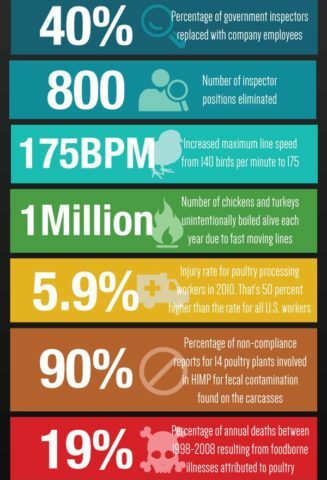
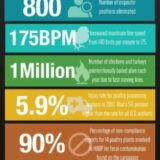
In most of the country the weather is finally getting warmer and the imagery of baby chickens and pastel eggs surround us – but yellow fuzzy chicks aren’t just a symbol for spring and Easter. They’re also part of the $38 billion poultry industry and a controversial proposal by the USDA to privatize poultry inspection.
In 2012, the USDA announced a proposal to expand a pilot program known as “HACCP-based Inspection Models Project” (or HIMP for short) that allows the poultry industry to reject government inspectors and allow company employees to police themselves. That’s right: The fox is literally guarding the hen house.
Obviously this is a big deal, so we created an infographic you can share about the 7 things you should know about the USDA’s plan to privatize poultry inspection. When you click on the image you will learn more about what you can do to speak out about this urgent issue.
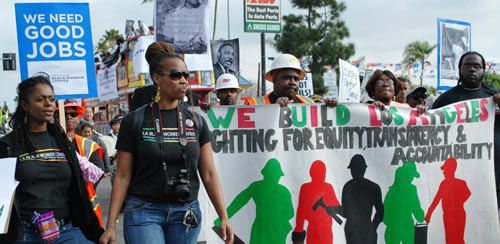
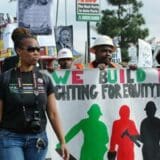
A recent report from the Los Angeles Black Worker Center addresses challenges facing African American workers, while offering strategies for combating unemployment and low wages. Black Worker Congress Blueprint for Addressing the Jobs Crisis focuses on information gathered from the Black Workers Rising for Justice, Jobs and Dignity congress, a gathering of workers and leaders of community and labor groups, held last September. The event, which occurred alongside the AFL-CIO national convention, gave African Americans a platform to voice concerns about labor and economic issues. Some of the report’s key findings:
The report cites some alarming statistics about the unemployment rates among blacks and whites from Steven Pitts, an economist from the University of California Berkeley Labor Center. Pitts claims that the unemployment rate for whites during the height of the recession remained below the nine percent jobless rate that African Americans faced before the recession even began.
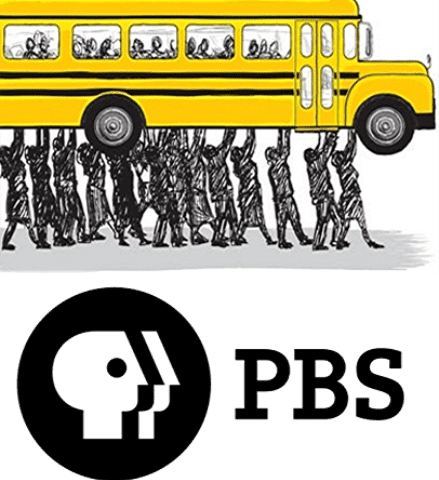
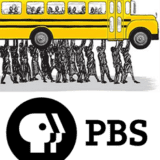
You’d think that that public television would support public education, but you’d be wrong. The Public Broadcasting System (PBS) has gotten in bed with the billionaires and conservatives who want to privatize our public schools. PBS has nary a word to say about the big money — from folks like the Walton family (Walmart), Microsoft founder Bill Gates, Eli Broad, business titan and former New York mayor Michael Bloomberg, media mogul Rupert Murdoch, Joel Klein (former NYC schools chancellor and now a Murdoch employee), and their ilk — that has been funding the attack on public schools and teachers unions. They’ve donated big bucks to advocacy groups, think tanks, and candidates for school boards who echo their party line.
PBS and its local stations have fallen all over themselves to promote Waiting for Superman, a documentary film that could easily been mistaken for a commercial on behalf of charter schools.
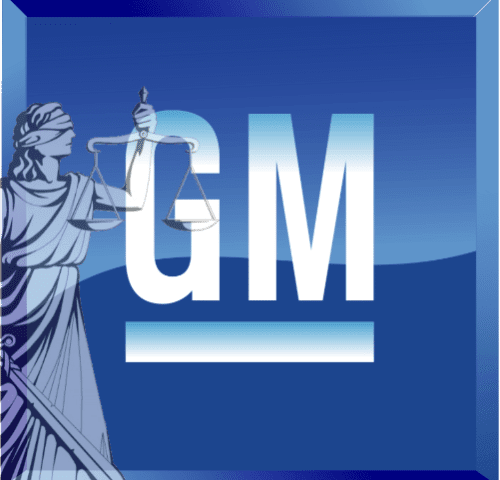
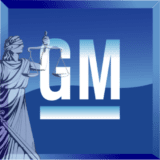
In 1895, Eugene V. Debs — the patriotic labor leader, socialist, and five-time presidential candidate — observed: “There is something wrong in this country; the judicial nets are so adjusted as to catch the minnows and let the whales slip through.”
In that regard, our justice system hasn’t changed that much in the 119 years since Debs uttered those words. We spend many more resources policing and prosecuting crime in the streets than crime in the suites, even though corporate crime is much more costly in terms of death, injury and disease.
If you need evidence of this double standard, look no farther than how the federal government has “punished” General Motors for failure to provide timely information about mishandling its recall of about 2.5 million cars with a defective ignition switches that the company has linked to 13 deaths.
On March 4, the National Highway Traffic Safety Administration insisted that GM answers 107 questions about why the company waited until this February to begin its recall when it knew about the problem as early as 2001.
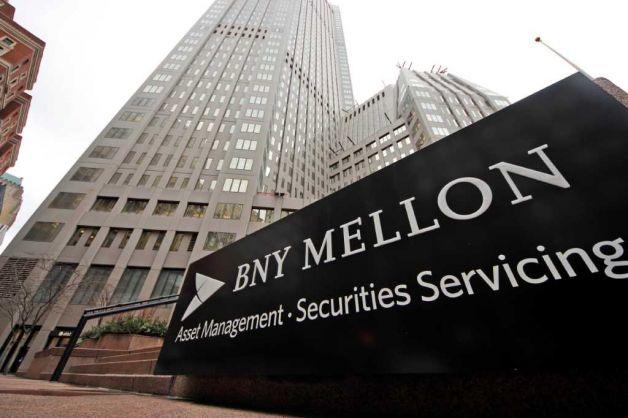

You know the old joke. It gets tailored for whatever the despised group of the moment is:
Q: What do you call 10,000 [lawyers/politicians/whatever] at the bottom of the ocean?
A: A good start.
I was thinking about that recently with regard to Wall Street and bankers. The popular (and populist) rage that has been rising against Wall Street seems to be reaching new levels. According to Gallup, Americans rank the “honesty and ethical standards” of bankers as “low” or “very low” at a rate about three times higher than we did in the mid-1980s. (The vast majority of that increase came after the most recent financial meltdown.) And politicians – even Republicans – now regularly use Wall Street as an easy punching bag for cheap political points.
It’s hard to argue with the sentiment. Those people did ruin a minimally well-functioning economy.
» Read more about: Study: Wall Street Banks Overcharge L.A. »